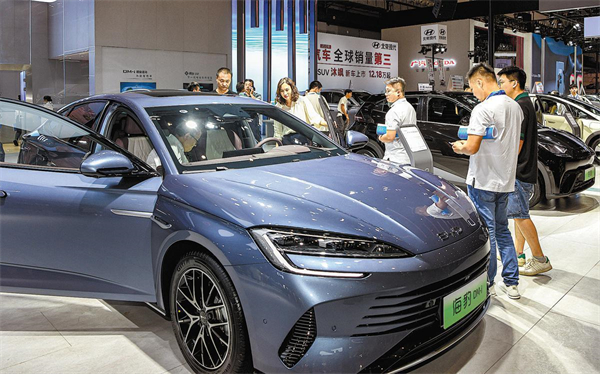
- Home
- Media Center
-
Events
- Wuzhen Summit
- Regional Forums
- Practice Cases of Jointly Building a Community with a Shared Future in Cyberspace
- World Internet Conference Awards for Pioneering Science and Technology
- The Light of Internet Expo
- Straight to Wuzhen Competition
- Global Youth Leadership Program
- WIC Distinguished Contribution Award
- Membership
- Research & Cooperation
- Digital Academy
-
Reports
- Collection of cases on Jointly Building a Community with a Shared Future in Cyberspace
- Collection of Shortlisted Achievements of World Internet Conference Awards for Pioneering Science and Technology
- Reports on Artificial Intelligence
- Reports on Cross—Border E—Commerce
- Reports on Data
- Outcomes of Think Tank Cooperation Program
- Series on Sovereignty in Cyberspace Theory and Practice
- Other Achievements
- About WIC
- 中文 | EN

Malaysia to accelerate digital, green development

Visitors check out a BYD sedan during an auto exhibition in Haikou, Hainan province, in September. SU BIKUN/FOR CHINA DAILY
Chinese companies are expected to play a key role in supporting Malaysia's green and digital economy amid closer China-Malaysia ties.
In the past few years, Malaysia has been talking about green energy and innovation, and big companies from China are making significant investments in this sector, said Wee Ka Siong, president of the Malaysian Chinese Association.
"(The companies from China) are doing something that is in line with the policy of the (Malaysian) government, so we welcome all these investments," said Wee, adding that he hopes Chinese companies can increase their investment portfolio in Malaysia and create more job opportunities for locals.
May 31 will mark the 50th anniversary of diplomatic relations between China and Malaysia. Wee told China Daily that investments by Chinese companies in Malaysia have generated mutual benefits for both countries and he hopes this relationship will continue.
With Malaysia's ambitious plan to become a digital economy hub in Southeast Asia, Chinese companies such as Huawei, Alibaba and BYD have become key players in Malaysia's push to accelerate its digital and green economic growth.
BYD, China's biggest electric vehicle maker, has received more than 10,000 orders since entering the Malaysian market in December 2022, accounting for more than 40 percent of the local EV market.
There has been a gradual growth of EV-related industries in Malaysia, such as charging stations and intelligent connectivity, said Liu Xueliang, general manager of BYD Asia-Pacific's auto sales division and president of BYD Japan.
"There will be some fundamental changes in (the country's transport) infrastructure with the development of EVs," Liu said.
Huge potential
He said there is huge potential for economic cooperation between China and Malaysia, which can provide opportunities for Chinese companies to work with their Malaysian partners in the green economy.
Malaysia and China should collaborate more in the electronics and electrical industries, moving from the assembly of chips and electronic equipment to integrated circuit design, said Koh Tsu Koon, chairman of the board of governors at Wawasan Open University.
"The IC (sector) has been dominated by the United States … and China is now an emerging player in this industry, so I think this will offer great opportunities for collaboration between China and the Association of Southeast Asian Nations," said Koh, noting this is particularly important for Penang, Kuala Lumpur and Johor — the three main centers of Malaysia's electronics and electrical design industries.

The World Internet Conference (WIC) was established as an international organization on July 12, 2022, headquartered in Beijing, China. It was jointly initiated by Global System for Mobile Communication Association (GSMA), National Computer Network Emergency Response Technical Team/Coordination Center of China (CNCERT), China Internet Network Information Center (CNNIC), Alibaba Group, Tencent, and Zhijiang Lab.





